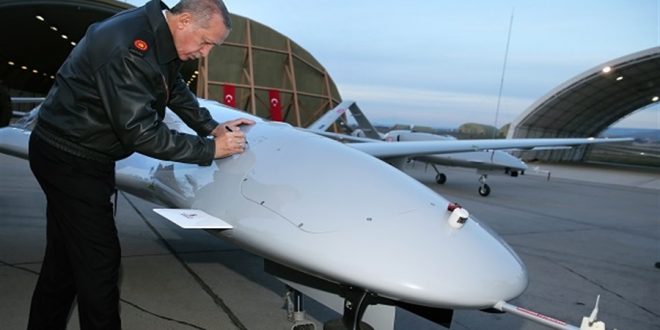Turkey, in recent years, has put high on its agenda the development of its military products, especially when it comes to aerospace industry.
Dreaming of a return to the golden age of the Ottoman Empire, President Recep Tayyip Erdogan has embarked on ambitious projects to develop the drone industry, and so far different generations of the unmanned aircraft, such as the “Bayraktar TB2” and “Anka”, or Phoneix, have been produced. Turkish leader repeatedly stated that his country will become one of the top 10 arms exporters by 2023.
Undoubtedly, the towering figure in the development of the Turkish drone industry is Selcuk Bayraktar, the son-in-law of the Turkish president. A graduate of MIT, one of the elite universities in the US, he holds the title of “godfather of Turkish UAV” industry. Ankara claims that they have produced advanced and efficient drones on their own in the past few years, which has led some military experts to refer to Turkey as a leading country in the field. But there are some doubts that Turkey has walked the path of this highly complicated technology all alone and thus fact-finding is necessary.
Extensive use of Turkish drones in regional crises and efforts to export them
Turkey’s focus on the drones use in its defense equipment dates back to the mid-1990s, when the country’s war against the Kurdistan Workers Party (PKK) was at its peak. Ankara first purchased drones from the US in 1995 to implement what it called “counter-terrorism” strategy. As the drones largely depreciated, Turkey purchased drones from the Israeli regime, which were fast removed from Turkish army service due to their low quality and frequent crashes.

But then the Turkish Aerospace Industries (TAI) started production of Anka, a medium-range drone, in 2004. The drone first flew in 2010. The dispute with Tel Aviv over the aid convoy to Gaza in 2010 and the ban on the sale of American Predator and Reaper drone models imposed by the US Congress prompted the country’s production of own drones.
The main manufacturers of UAVs in Turkey are TAI and Baykar. Meanwhile, the most advanced and successful drone made in Turkey is “Bayraktar TB2” produced by “Baykar Makina” company. The drone is currently considered the most successful product of Turkey’s defense industry. Israel Defense magazine in 2019 rated it as “one of the best of its kind.”
Bayraktar TB2 was first operationally used in 2014 against the PKK. Reports suggest that Ankara operated the drone during conflicts in northern Syria, Yemen, Libya and the Karabakh dispute that reignited into a full-scale war from September to November 2020. The most important operation taking advantage of the drone was the attacks at positions of the Libyan National Army (LNA) led by General Khlaifa Haftar, a Gadhafi regime’s holdover. Turkey has also used such drones to assist Azerbaijan during the three-months-long war against Armenia over the disputed Karabakh region.
Evidence and reports indicate that Turkey intends to sell this drone type to the Ukraine as the situation between Kiev and Moscow remains combustible amid a deadlock with pro-Russian eastern separatists. In October 2019, Kiev announced its intention to purchase 48 Bayraktar TB2s. In addition to Ukraine, Tunisia has reportedly purchased a number of drones, Anka type, from Turkey.
Is Turkey really self-reliant in drone industry?
Despite all of Ankara’s claims about progress in the UAV development and production, parts used to manufacture and equip these weapons are not homegrown. The most tangible document in this regard is Erdogan’s statement on January 25, in which he criticized his country’s NATO allies as “bad neighbors” for freezing drone parts supplies. He stressed that their refusal to supply spare parts, especially drone cameras, is the reason why Turkey needs to produce more components domestically.
Making such comments amid reports indicating that drone components supplies to Turkey have been blocked by Western countries like Britain and Canada during the Nagorno-Karabakh crisis shows that Turkey, just contrary to its earlier claims, is far from self-efficiency in the drone industry.
As the first action, in October 2019, when Turkey used Bayraktar drones against Kurdish forces in its attacks on northern Syria, the Canadian government blocked Canadian companies’ cooperation with Ankara in the drone industry. In addition to Canada, a British company has recently stopped supplying parts to the Turkish drone company after Turkish use of Bayraktar drones in Karabakh war was confirmed.
In addition to Britain and Canada, the US companies partnering with Turkey in the drone industry have also been subjected to pressures. This came after Armenian expats protested in October 2020 the sale of UAV-related products and technologies to Turkey, prompting American companies to withhold drone components from the Turkish companies. Also, in October last year, Rotax Group, the Austrian company which manufactures Bayraktar engines, announced that it would stop supplying the product to Turkey.
 Eurasia Press & News
Eurasia Press & News



